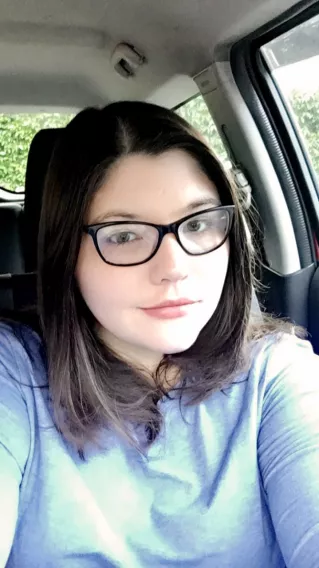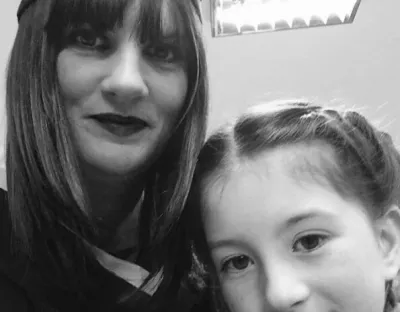Mary Ellen O’Keeffe is a graduate of the MA in Sociology (Applied Social Research). As a UL undergraduate student, she explains why she chose to also pursue her postgraduate degree at UL and describes her experience of the programme.

Can you please introduce yourself and explain why you chose the MA?
My name is Mary Ellen O’Keeffe; I’m 30 years old and from Limerick. Prior to the MA, I did my undergraduate degree in UL. I went to UL to study English but ended up falling in love with sociology, in particular, Social Research Methods. So that was my motivation for doing the MA. I knew I wanted to do social research and so I spoke to some of the staff in UL’s sociology department, and when they told me about this MA, I knew straight away that it was the course for me.
Why at UL?
For starters, the campus is beautiful, and I really enjoyed studying there for my undergraduate degree. But really, it was the Sociology Department that did it for me – they’re really second to none. The staff there are exceptionally supportive of their students – both personally and with regards to the work. I knew that they would allow me to do work that was interesting to me but also support me to get the best results possible and the most from my degree. The wider academic and personal supports available within UL were also a standout factor for me.
….it was the Sociology Department that did it for me – they’re really second to none. The staff there are exceptionally supportive of their students – both personally and with regards to the work.
How did you find out about the course?
As I studied within the sociology department in UL, I was approached by a couple of staff members there about different MA programmes on offer in UL. Some of my lecturers explained what courses they thought would suit my interests and the route I wanted to take. However, it wasn’t until I approached Carmel Hannon in the sociology department, who I would consider a mentor, that I really found out more about this specific MA. She mentioned this particular program and said that it would be a really good fit for me, and she was spot on.
What specific aspects of your course have impressed you the most?
I think the variety of modules impressed me the most. I chose to do two basic qualitative and quantitative modules, but I still had a variety of choice with regards to what I would do for my third module. I felt that these modules really challenged me, in the best way, both in collaborative classes and through the pieces of work that I did. The value from these pieces of work is really coming to light now that I have graduated, as it’s something that employers often ask about in interviews. Being able to use those pieces of research as examples to employers of what I can do really is invaluable. The variety of modules has definitely given me a very kind of varied skill set, which, as I said, is very impressive during interviews, but those skills will also stand to me in the workplace, in a practical sense. So, I think the MA has given me an excellent foundation.
The variety of modules has definitely given me a very kind of varied skill set, which, as I said, is very impressive during interviews, but those skills will also stand to me in the workplace, in a practical sense.
Can you describe your learning experience during the course of the MA programme?
The best thing about working with the sociology department is the support that they provide you. I worked part-time while doing my MA, and they were super supportive around that. They were very understanding when I might have to leave classes early at times. They were also very open with regards to office hours if I needed to discuss something. Another thing I really appreciated was how interested they were in my studies and in me. If I wanted to take things in a little bit of a different direction, they would sit down and talk that out with me, give me some advice, and we would come to a well-rounded conclusion. It was really amazing to have that collaborative relationship with the lecturers. I definitely got the feeling that they were very much investing in us as much as we were investing our time, effort, and money into this program – they were willing to invest in us. As a result, the University was investing in us.
Can you provide an insight into how the course is delivered and how you are assessed?
You have a few contact hours a week, usually around 2 to 3 per module. Those could be in computer labs depending on if you need to use software or other times in a regular class setting. Most of the modules were continuously assessed. There were a few exams but nothing too major. The lectures are very approachable with regards to deadlines. There was always a bit of flexibility within reason around most things so that we didn’t end up, for example, having three very large assignments due in one week. With regards to continuous assessments, an example of the type of work I did was that I had to keep a diary for 12 weeks on various examples of social exclusion that I saw, there was also some quantitative research data that I had to analyze, and so there was quite a variety in there, which kept things interesting.
What else (other than course learning outcomes) have you gained from the course?
I think I’m definitely much more confident in my abilities as a researcher now. I feel I could actually go into a job and do it effectively. I feel like I have a varied skill set that is valuable to employers; I just have much more confidence in my foundational skill level as a researcher. I’ve also honed in on a skill set by doing this MA, which has definitely made my CV much more attractive to employers.
I think I’m definitely much more confident in my abilities as a researcher now. I feel I could actually go into a job and do it effectively. I feel like I have a varied skill set that is valuable to employers;
What are your future plans?
After I handed in my thesis, I decided to take a couple of months as a break because I had been in University for five years straight, and I really wanted to kind of get my head together and figure out where I wanted to go. I had planned to go to Canada once I was finished, but like many others, those plans were put on hold due to Covid 19. I have been getting interviews from different organisations since I finished the MA, which is exciting. In fact, nobody in my class has had any trouble getting interviews which speak volumes of the quality of this MA. I would love to do a master’s in economics at some stage as I think it would tie in well with my current skillset, and I really love the subject.
In fact, nobody in my class has had any trouble getting interviews which speak volumes of the quality of this MA.
Would you recommend the program to others and would have any advice or tips for perspective students who are thinking of applying to the program?
I would definitely recommend the program to anybody interested in research or sociology; it’ll be right up your street. It’s like a one-year crash course in the whole thing. If you are currently studying, definitely take as many research modules as you can if that’s a possibility for you. And no matter what you are currently doing, do some reading. There’s plenty of resources available online. I would also recommend you do some statistical maths – it won’t do you any harm. For anyone who has been accepted, my one piece of advice would be to make sure you pick modules that are foundational, so get your qualitative and your quantitative modules in there. Do both of those, and then pick other modules that will complement those. If you actually want to become a good researcher and pursue it as a career, you need to have your foundational skills covered. I think people get terrified of quantitative methods, but it really isn’t nearly as bad as you think that it is. On a couple of occasions, I went up to the maths learning centre when we were coming up to exams just to practice formulas, and they were super. I wouldn’t be exceptionally good at maths, I’m definitely more suited to the arts side of things, but I’ve gravitated towards it more and more and gained confidence in it as a result of this MA, so you don’t need to be exceptionally good at maths for this course. A very good teacher of mine once said to me that maths is all about confidence and I believe that that’s true. In reality, the software does a lot of the work for you, so it’s just about getting over that initial fear. As I said, get the foundational stuff right, and the rest will follow. Also, realise that you’ve been accepted into this because you are qualified to be there, so whatever you take on, whether it be quantitative or qualitative or both, try and leave the fear at the door, be confident!

